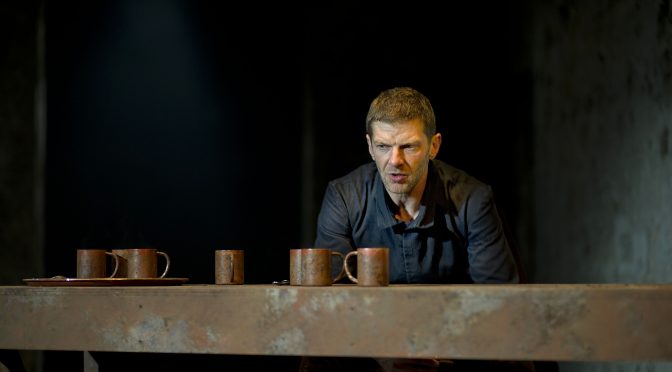As The London Magazine’s resident theatre mole, your intrepid reviewer went subterranean to visit The Old Vic Tunnels for Beth Steel’s apocalyptic new play Ditch.
Located beneath Waterloo station and approached along a depressing back street, the venue is actually a happy compromise away from the more adventurous site-specific locations that can be something of an ordeal. It still gets cold and it smells a bit but, with comfy seats donated by Banksy and a bar that boasts no fewer than four designers, it is achingly cool and London’s most exciting new theatrical space.
More importantly, the creative team behind Ditch have used the venue well. Installations surround the auditorium. Plant-covered mill wheels are atmospherically lit and a dismembered tree hovers, upside down, over a bright red circle of cloth. It’s great scene setting and appropriate for the dystopian scenario that unfolds.
Although Ditch is set in the countryside and much of the action takes place out of doors, the survivor’s predicament is perfectly reflected by the large design team headed by Takis. Superb lighting and sound by Matt Prentice and Christopher Shutt add to constructing this frightening world. Here, while ‘security’ forces live in isolation with their housekeepers and search out ‘illegals’, there are some captivating moments – the sighting of a stag in the mist or the creation of a sunset that subtly suggests an atomic cloud.
There’s some superb acting as well. Sam Hazeldine plays the foul-mouthed Turner, dedicated to his soldier’s life with edgy brutality. Danny Webb is his commander, Burns, and convinces as a thoughtful, broken man who can remember what civilisation used to be like. Fighting off memories of the past as a strategy to survive is Dearbhla Molloy’s formidable Mrs Peel. This is a wonderful performance, as she looks after the men and herself with humorous, steely determination. Her other charge is the young Megan (Matti Houghton) who gives a touching portrayal full of small rebellions and a quest for love with spirited new recruit James (Gethin Anthony).
But what of the play itself? Steel has set out a standard science-fiction scenario with the odd little tactic of leaving out all the details. We are never told what has happened to the world and given next to no back-story for the characters. Avoiding specifics deprives us of questioning events or degenerating into adolescent paranoia. I suspect the idea is to focus instead on the characters’ reactions and some abstract ideas about the environment. This isn’t a trade off worth paying. Perversely, Steel ignores her own lesson that people can live in the moment and snatch joy in the worst of times to persist in a vision of the future both bleak and vague.
Until 26 June 2010
Photo by William Knight
Written 21 May 2010 for The London Magazine

